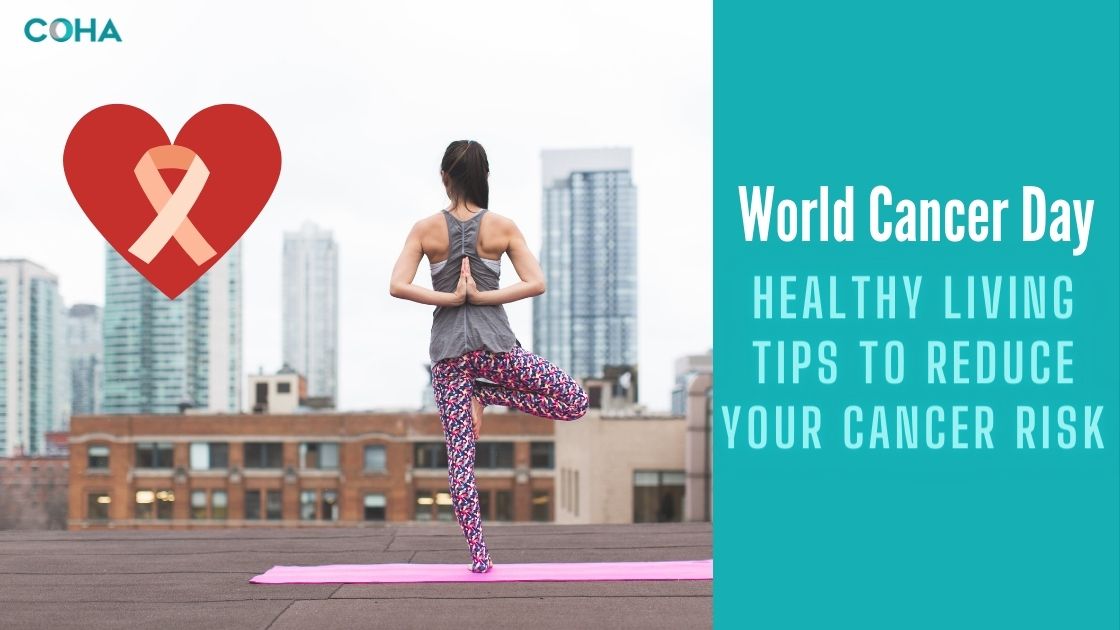


Every year, 8.2 million people around the world die from cancer. However, a healthy lifestyle can eliminate more than a third of the most common cancers. Each year on the 4th of February, World Cancer Day is celebrated across the globe to raise awareness of cancer detection, causes, signs, and treatment.
Believe it or not, maintaining a healthy lifestyle can save you from dealing with many health problems and concerns. Healthy eating habits include incorporating plenty of fruits, vegetables, whole grains, nuts, legumes, healthy fats, such as olive oil, white butter, and fish (instead of red meat) in your diet.
Food and beverages that increase cancer risk include alcohol, processed meats, high-calorie foods, refined sugars, and fats from animal sources. In fact, consuming alcohol is known to heighten the risk of several cancers, including cancers of the pharynx, mouth, esophagus, liver, breast, etc.
It is equally essential to be physically active along with maintaining a healthy diet. Running, jogging, walking, hitting the gym, or simply doing yoga at home, can help you achieve your fitness goals as well as keep you away from all kinds of diseases, illnesses, and obesity. The U.S. Department of Health and Human Services and the American Cancer Society suggests that individuals perform at least 150 minutes of moderate physical activity each week or do at least 75 minutes of intense physical activity each week. Participate in a moderate to intense exercise for at least 30 minutes a day on most days of the week to lose weight.
Not just on World Cancer Day, but almost every day and everywhere, we see signs and advertisements telling us about the harmful effects of cancer. You put yourself on a collision course with cancer by smoking any form of tobacco. Smoking has been associated with numerous cancer forms, including lung, mouth, throat, larynx, pancreas, bladder, cervix, and kidney cancers. Exposure to second-hand smoking is equally dangerous. On World Cancer Day, take preventive steps to quit smoking and contact your doctor on how you can quit tobacco usage.
Hereditary factors can also, at times, increase the risk of certain cancers. It is best to be aware of your family’s cancer history, including the cancer type and age of diagnosis among your relatives. You should also share this information with your doctor. Your family’s medical history can help your doctor identify your cancer risk and determine an appropriate screening and prevention.
Yes, it is vital to get exposure to the sun, but an excess of anything is bad. There are several known harmful effects of UV Radiation. Avoiding tanning beds or sunlamps and minimizing the amount of time you spend in the sun is important. Cover your skin as much as possible with tightly woven cloths of bright or dark colors as it deflects UV light. Additionally, try to stay in the shade as much as you can when you are outside. Use a broad-spectrum sunscreen with an SPF of at least 30. Apply sunscreen regularly and reapply it every two hours, or more often if you are swimming or sweating.
Another important cancer prevention measure is getting the proper vaccines. Talk to your doctor about vaccination against:
Practice safe sex. People who have HIV or AIDS are at increased risk for anus, liver, and lung cancer. HPV is most commonly associated with cancer of the cervix, but it can also raise the risk of anus, penis, mouth, vulva, and vaginal cancer. Each of these can also spread if you share needles.
Last but not least, we recommend you get regular exams to increase your chances of discovering cancer early. This is when treatment is most likely to be successful.
World Cancer Day spreads awareness about simple yet crucial habits you should instill in your daily life. If you would like a consultation, contact us at Chesapeake Oncology Hematology Associates to make an appointment. We can answer all your questions and help you get screened for cancers and precancers to minimize your risk of the disease.